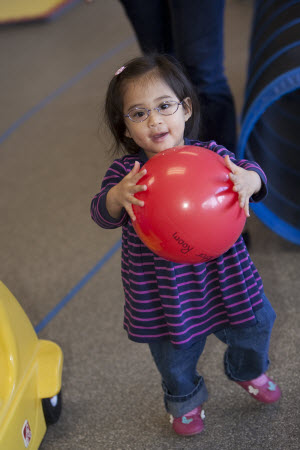 The year 2012 marks the 50th anniversary of Kindering, a not-for-profit neurodevelopmental center founded in 1962 by five Eastside mothers of preschoolers with disabilities. In the five decades Kindering has been providing early intervention services and support, the number of children helped has grown from that original five to over 30,000.
The year 2012 marks the 50th anniversary of Kindering, a not-for-profit neurodevelopmental center founded in 1962 by five Eastside mothers of preschoolers with disabilities. In the five decades Kindering has been providing early intervention services and support, the number of children helped has grown from that original five to over 30,000.
Today, Kindering helps more than 3,000 infants and children with special needs each year. The center’s own data indicates that 97% of the children they have helped make progress; 73% narrow the gap with their typically developing peers; and 36% no longer require special education services after age 3.
We had an opportunity to interview Kindering Executive Director Mimi Siegel about the unique role the organization plays in our community and as a nationally recognized creator of program blueprints for other early intervention centers around the country and world. Siegel, who has been with Kindering for over 30 years, describes the center's work easing and enabling pathways for children and families to move through the many referrals, decision points, and services within our community "a labor of love."
Can you share a bit more of the founding story of Kindering?
A woman named Gert Wyse was married to a fellow who was the head of King County Parks, George Wyse. They lived in Juanita on some park land; you have to consider that half a century ago, that area was rural. Her sixth child, Debbie, was born with Down's Syndrome, in the very early '60s, and she was worried that, living in this remote area, her daughter wouldn't have friends. So she talked her husband into having a swim lesson for young kids with disabilities at one of the county pools. About five families showed up.
The families that got together for the swim lesson thought it was terrific and decided that they wanted to do more than just socialize. At that time, children with disabilities weren't allowed in the public school system until they were 7, as they weren't considered educable. So the families formed a little preschool called the Eastside Preschool for the Special Child. The preschool opened in 1963. They were just a very determined and creative group of people — truly pioneering — and they made it happen.
That preschool changed name a couple of times, but eventually evolved to be the Kindering Center. Our focus is still the same: We help children with delays to reach their full potential. Rather than five children, we now see in any one year about 3,300.
What are the primary services and programs Kindering provides to children with special needs and their families?
Our mission is to close the gap for children who are born with disabilities and for children who come from homes that may not be as advantaged. Birth to age 3 are the most critical years, when early intervention makes the greatest difference. Early intervention can take the forms of physical therapy, speech therapy, special education, and feeding and nutrition therapies for infants and children who have a diagnosis or a significant delay.
It also takes the form of outreach to homeless shelters and non-English-speaking families and foster homes to make sure that we're identifying children and giving them what they need, even if what they need comes in the form of coaching their parents or working on attachment skills for children who are in foster care or helping childcare workers produce a more meaningful curriculum. Sometimes the intervention is for kids who are at risk, not because of a disability, but because of a different kind of risk, say an environmental risk.
The other thing Kindering is well-known for is our family support programs. We are the ones who nationally pioneered the Fathers Networks program, sibling support programs, and family and couples therapy. What distinguishes us as an organization is that we provide a real continuum of support and therapies for the families, what you could call a wraparound service.
What organizations do you partner with to provide support to families?
On the Eastside, there is a very purposeful movement taking place called Eastside Pathways, mostly centered around Bellevue organizations that have joined together and participate in a coordinated "from cradle to career" system ensuring that there really is a pathway of care for young children and families.
The second is some very deliberate contracting we do with, for example, Childcare Resources, where we have a certain expertise in intervention and they hire from us to add our expertise to their bigger picture. And then there are a number of early intervention centers throughout King County and throughout the state with whom we have close working relationships.
The Eastside school districts all contract with Kindering — some even have staff they station at Kindering — to make sure that a child's progression/transition from birth to age 3 into the school districts is absolutely seamless. It's a very well thought out collaboration.
How do families typically first get connected with Kindering?
All the physicians on the Eastside are wonderful referral sources, as are the hospitals. Public Health, Child Protective Services, Children's Hospital, Swedish Hospital, Group Health — they all know us and refer quickly. You really know that you're making an impact when families refer.
Where do you see the biggest social, financial, and personal impacts of Kindering's programs and services in our community?
Knowing that birth to age 3 are really the critical years of intervention heightens and amplifies the significance of the work that we do. We've been taking data as an organization and seeing national research studies that confirm early intervention makes a significant difference. In terms of evaluating if what Kindering does is a worthy effort, it definitely feels effective and important.
Individually, the rewards come in seeing families come to us when they are most raw and facing what we call "an unexpected journey" and being able provide needed support. As one dad put it: "We were in a darkened room and we couldn't see the next step, and Kindering was there with a lamp, lighting the way." His other phrase, which really moved me, was: "It's like training wheels — you're kind of falling from side to side, but you know you're not going to fall over, because Kindering is there to stabilize you." I think that's the role that we've had.
How would you describe the approach Kindering takes in helping children with disabilities?
Our work is so customized, so individualized, to the child and the family, so you're hearing this story with a different twist, and in a most meaningful way — day after day, hour after hour. I recently followed a physical therapist to a home visit for an appointment. It was for a child with very severe motor-skills delays, and the therapist had designed equipment especially for him so that he could hold his toys and play successfully with them. The other thing she brought was an old toy that they quit making because it wasn't heavy enough for most children; but it was perfect for this little boy, because he could use it like a walker. It was light enough that he could push it. The therapist, knowing that this toy wasn't manufactured anymore, has been finding them at garage sales.
This is typical of the kind of really exquisite, individualized work we do — sensitive to what the family can do and what the child needs. Of course we have all this fancy medical equipment in addition, but this way of really making it work and coaching and encouraging the family, breaking it down into tiny steps that Mom can work with. I've been doing this for 30-some years, but this brought tears to my eyes. So elegant. The next kid and the next family will have a totally different story and situation, but we will give it our finest expertise, sensitivity, and care.
What about Kindering's current prognosis for maintaining or increasing necessary funding? What are the organization's current needs and how can the Puget Sound community help meet them?
It's hard right now. What has happened on the state and county level is that funding has been held flat, even though our service numbers have doubled. What this translates into is that the fees we're getting are about half of what we had before. The other thing is that the work is costlier — there are lots more children on the autism spectrum, for instance, and that is a costly group. At any given time at Kindering, 48 different languages are spoken, so using interpreters and hiring bilingual staff is another challenge. We also do home visits, so even gas prices are barriers for us as an organization.
So, cutting our fees by half, doubling the number of kids, and the fact that all the service is more complex has created a challenging financial situation for us.
We are active in fundraising and the community has been incredibly generous — foundations and some of the organized efforts like United Way and Seattle Foundation and other family foundations, individuals and corporations have really embraced our children and the progress they can make. Even our athletic teams, the Mariners and the Sounders, have come through for our kids.
Kindering enjoys its 50th anniversary this year — how is the organization marking and celebrating this landmark occasion?
Kindering’s 50th Anniversary Celebration and Auction, held in March in downtown Seattle, was a wonderful gala celebration. We're also terribly excited about a reunion this summer, in July, at the Woodland Park Zoo, of all families and past board members and staff over the last 50 years. That will be a lot of fun! We have a fundraising luncheon coming up in October, and there will be other events throughout the year.
What volunteering opportunities are available to people who want to help families served by Kindering?
We always love volunteers and would encourage people to call about volunteering at a special event, as an example, or visit our website. There is a whole variety of ways people can get involved.
Aside from volunteering, I always talk about the "ABCs." A is for advocate — advocate for kids with disabilities and for identifying children who need services as early as possible. My B, is "befriend" — having a kiddo with a disability can be isolating, for the family and for the child, so I encourage neighbors to reach out, to be more sensitive. My C is "Contribute" — there is such a funding gap.
If you could wave a magic wand, what would you change?
Early intervention is so critical, so the main thing is that the kids need to be identified. In terms of the funding, our legislators are wonderfully responsive and caring about the work we're doing. They are giving it their best attention, even in this difficult budget crunch time. They take our calls and they listen. But we need a systemic solution. There has been a ceiling on the amount of funds that the state gives to this birth-to-age-3 effort and there shouldn't be a ceiling; it should be mandated per child.
There are some efforts to change insurance so that more therapies are covered. Lastly, some states use Medicaid to cover some of the education programs and additional therapies. There are things we can do if we make a consolidated effort. The return on that investment is very clear, because, again, 36% of our kids don't need ongoing special education, which saves money down the road. It would be imprudent not to make sure that we have this therapy for all kids.











